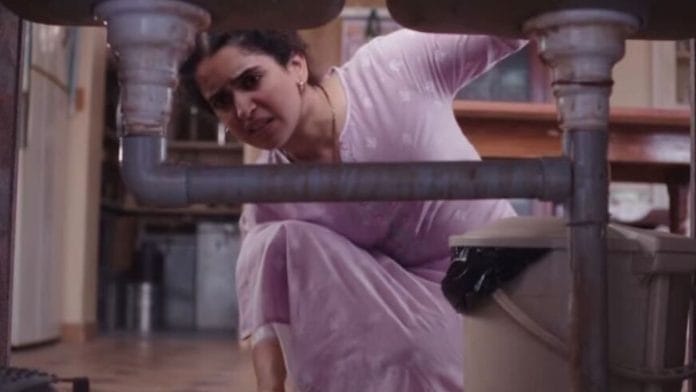New Delhi: Recalling her time writing Mrs, a Hindi adaptation of Jeo Baby’s Malayalam film The Great Indian Kitchen, Anu Singh Choudhary was alternating between crying and scripting. That’s the kind of impact Mrs has had on the writer. The film released Friday on Zee 5.
The Great Indian Kitchen was a conversation starter when it was released on Neestream in January 2021, and eventually on Amazon Prime Video.
Co-written by Anu Singh Choudhary and Harman Baweja, Mrs looks at how patriarchy manifests itself through house work expected of women in a household, especially in the kitchen.
“It is deeply personal and extremely triggering to talk about things I have experienced, and seen all around me growing up, and even after being married,” said Choudhary. She also welled up when she stepped on set for the only time. The production designers were able to accurately recreate a middle class north Indian household, from the sofa cover to the kitchen shelves.
In Mrs, Richa (Sanya Malhotra) marries Diwakar (Nishant Dahiya) through an arranged marriage set up, and is almost immediately thrown into the deep end. In her new household, not having a job is a badge of pride for women and making good food is a turn on for the husband. “The film is about autonomy and choice within a familial system. It will be triggering because of the guilt of being complicit, whether or not you are a woman,” said Choudhary.
The journey started in 2022 when her agent texted her to ask if she’d seen Baby’s movie. “I replied saying that if there was any enquiry about an adaptation, I was in, no questions asked,” said Choudhary.
It was suggested to Choudhary as a must watch in 2021, but she was reluctant. “I was told about the movie when I was down with Covid, and initially I did not want to watch it because I knew it would be triggering, and I was already isolated. And then I did,” said Choudhary.
Watching the film felt like a slap for the screenwriter, as she became aware of how normalised patriarchy was in her own household, and how she too was complicit. It was the small things, like taking pride in bringing her grandfather his chappals the moment he got home.
“It brought up lived experiences, and the kind of relationships with our mothers, as faceless caregivers,” said Choudhary, who is from Bihar.
Also read: ‘Loveyapa Ho Gaya’ is this year’s Valentine’s Day anthem. It’s not cringy
A cathartic experience
What shifts in the Hindi adaptation is the setting, from a Malayali to a deliberately unspecified North Indian household—rice changed to hot phulkas.
“This is just the kind of film, with a clutch of effective performances and important messaging, which should be made mandatory viewing for couples. Women are not just primary or secondary numbers; they are the ones that make things, and people, whole,” wrote film critic Shubhra Gupta in her review of the film.
Diwakar and his father (played by Kanwaljit Singh) were inspired by a former neighbour of Choudhary. “They were both doctors, earning well and were very social. But they were looking for a bahu who was not a doctor because then she would not be able to give time to the home, make food and host people. They wanted a trophy wife who can become a glorified domestic worker,” said Choudhary.
In the Malayalam original many things were left unspoken, Baby relied on subtext to bring the matter alive. There was less saying and more showing. In Mrs, there are more vocal moments including Richa talking about her desires, professional or sexual, to her husband, only to be gaslit.
Choudhary wanted to look at a family that had the means to hire help, but would rather make the women of the household work. And in her version, the husband is a gynecologist, a master of the female anatomy, who makes no attempt to understand the psyche of his wife.
Details were important to Choudhary. Down to the yellow saree Richa is wearing when she steps inside the house, common for new brides in Uttar Pradesh and Bihar.
“My key takeaway from writing the film is not accolades, but the courage I have found in not being ashamed of the art and talent I have, and of learning to walk away from toxic situations. It is extremely personal and cathartic. I will keep going back to it,” she said.
(Edited by Theres Sudeep)






